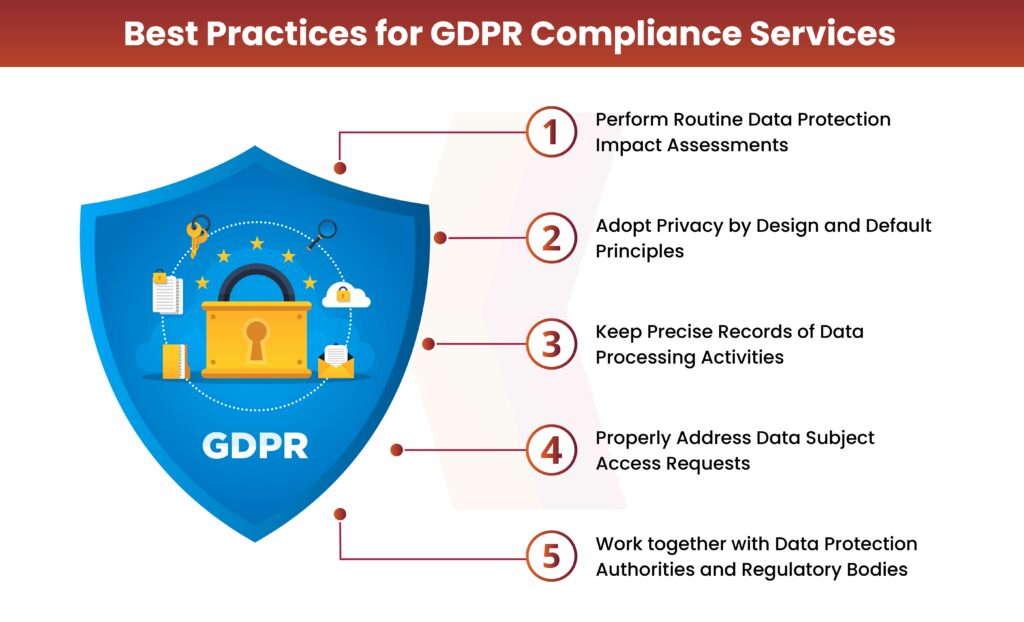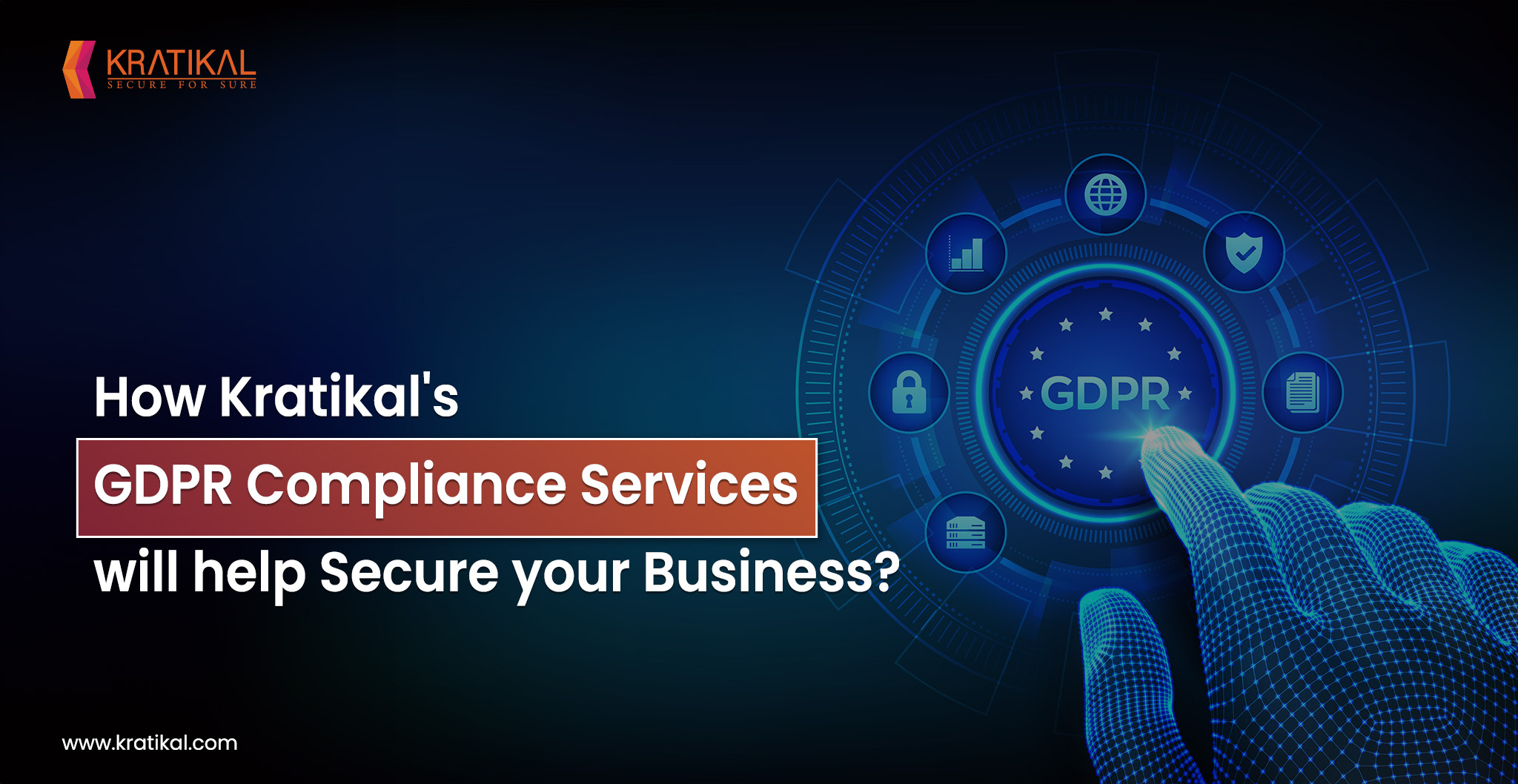The internet’s widespread availability has changed the world. It has transformed how we talk to each other and get things done every day. We can now share files, pay bills, and shop by putting our personal details online. But do we know the risks of giving out our private information in these transactions? We might wonder what happens to our data or where our personal details end up. This personal information includes not just our banking and contact details, but also our social media profiles and even our IP addresses. Companies tell us they’re collecting our personal data to serve us better. But do you think they use this info to improve our experience? Not a chance. This content piece will explain GDPR Compliance services, a new European law that aims to change how businesses collect, store, and use customer data.
Table of Contents
Overview of GDPR Compliance Services
The GDPR aims to increase individuals’ access to personal data. This is aimed at standardizing data protection practices across the European Union or EU. Organizations need to first comprehend the main requirements and rules of the legislation. In order to gain a better understanding of compliance, one must ensure obtaining well-informed consent and provide a transparent account of the data processing activities. It is crucial to improve data quality and accuracy as well as to implement security measures. This would help to guard against loss, theft, and unauthorized access. It mandates that companies conducting extensive data processing and subject monitoring appoint a Data Protection Officer (DPO). This DPO oversees the company’s data governance and compliance responsibilities.
Companies that don’t follow the rules can face tough legal consequences. They might have to pay fines as high as 20 million euros (about $22.07 million) or 4% of their yearly worldwide income. Also, the DPO makes sure the right data protection rules are used to keep personal information safe.
Book Your Free Cybersecurity Consultation Today!
Why do Organizations need to be GDPR Compliant?
The GDPR governs the transfer of personal data outside the European Union and the European Economic Area, ensuring data owners have the right to data portability. It mandates that businesses implement robust data security measures to protect personal information from loss or unauthorized disclosure. Organizations should focus on upholding the right to a “Private Life” for individuals in the EU, emphasize the importance of controlling, protecting, and securing private data, and ensure that full control of personal information remains with the legitimate owner, the end user.
Why Choose Kratikal for GDPR Compliance Services?
Kratikal offers a comprehensive suite of solutions to streamline your privacy, security, and governance programs, empowering you to build a robust GDPR compliance services framework. Kratikal keeps you updated with the latest GDPR developments through its regulatory research portal, which is supported by researchers and legal contributors. With assessment automation, data mapping, discovery, and classification, vendor risk management, incident management, privacy rights (DSAR) management, cookie consent, and universal consent management, Kratikal provides everything you need to operationalize and enhance your GDPR compliance efforts.
Get in!
Join our weekly newsletter and stay updated
Kratikal’s Approach to Help You Achive GDPR Compliant
Kratikal’s expertise in identifying vulnerabilities, managing data breaches, and providing employee training on GDPR principles ensures that businesses comply with legal requirements.
Data Discovery
The initial and key step to comply with GDPR is to locate data using tools like the Data Recording Template. This approach requires several steps, including discovery, planning, investigation putting into action, go-live, and handover.
Data Protection Impact Assessment
The focus will be on determining the need for a DPIA. Describe the processing, consider consultation, determine the necessity and proportionality, and so on. Identify and assess risks, devise risk-mitigation strategies, sign off and record outcomes, incorporate outcomes into the plan, and keep an eye on the situation.
GDPR Program Implementation
Breach management, privacy by design, data subject access, security safeguards, accountability, third-party management, data quality and rectification, and preventive measures are some of the key GDPR principles for program execution.
Ongoing Program Operation and Monitoring
Regular reviews, GDPR audits, sustainability pack, compliance paperwork, staff training, and awareness would all be part of the Ongoing Program operation and administration to ensure a long-term model.
Best Practices of GDPR Compliance Services
Here are five essential steps to follow when evaluating data compliance practices within your organization.

Perform Routine Data Protection Impact Assessment
Regularly conducting Data Protection Impact Assessments (DPIAs) is crucial for maintaining compliance. By embedding DPIAs into routine operations, businesses can proactively address emerging risks and ensure ongoing compliance.
Adopt Privacy by Design and Default Principles
Privacy by design and default are principles that emphasize the incorporation of privacy protections into the design and operation of systems, products, and processes from the outset. This involves integrating privacy considerations at the earliest stages of development, rather than addressing them retroactively.
For example, if a company developing a mobile app that collects user data implements encryption processes during development, it can significantly reduce the risk of data breaches. By taking this approach, businesses can strengthen data protection, minimize privacy risks, and demonstrate compliance with GDPR.
Keep Precise Records of Data Processing Activities
Maintaining precise records of data processing activities is a crucial component of GDPR accountability and compliance. Comprehensive documentation helps establish an audit trail, demonstrating accountability to regulatory authorities. These records should include:
- The purposes of data processing
- Types of data involved
- Categories of data subjects
- Details of any third-party data sharing
Properly Address Data Subject Access Requests
Under GDPR, individuals have the right to access information about the data an organization holds about them and how their data is being processed and stored. Data Subject Access Requests (DSARs) can be made by any individual, so it’s crucial to implement efficient procedures for handling these requests to ensure compliance with regulations.
Work Together with Data Protection Authorities and Regulatory Bodies
Organizations should maintain open communication with relevant authorities, such as data protection supervisory bodies, to seek guidance on compliance issues and report data breaches. They should also address any concerns or inquiries from these authorities.
Conclusion
GDPR compliance services are essential for businesses to protect personal data, maintain trust, and avoid significant legal consequences. Kratikal offers a comprehensive suite of services designed to help organizations navigate the complexities of GDPR by providing tools for data discovery, impact assessments, and ongoing compliance management. By integrating best practices such as conducting regular DPIAs, adopting privacy by design, maintaining precise records, and collaborating with data protection authorities, businesses can safeguard personal information and ensure they meet regulatory requirements. Embracing these practices not only helps in mitigating risks but also reinforces a commitment to privacy and data protection in today’s digital landscape.
FAQs
- Why is GDPR important?
The demand for tighter regulation on how companies handle customer data collection, usage, sharing, and deletion has significantly increased. The GDPR requires businesses to have robust controls and data management solutions in place to protect the personal data of EU citizens, no matter where the business operates.
- How long can personal data be retained under GDPR?
The GDPR does not define specific retention periods for personal data. Instead, it mandates that personal data should only be retained in an identifiable form for as long as necessary to fulfill the purposes for which it was processed.








Leave a comment
Your email address will not be published. Required fields are marked *